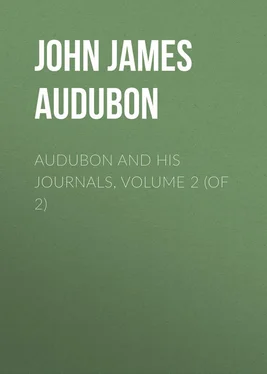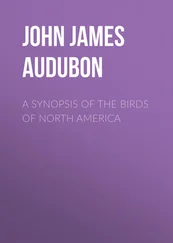John Audubon - Audubon and his Journals, Volume 2 (of 2)
Здесь есть возможность читать онлайн «John Audubon - Audubon and his Journals, Volume 2 (of 2)» — ознакомительный отрывок электронной книги совершенно бесплатно, а после прочтения отрывка купить полную версию. В некоторых случаях можно слушать аудио, скачать через торрент в формате fb2 и присутствует краткое содержание. Жанр: foreign_antique, foreign_prose, на английском языке. Описание произведения, (предисловие) а так же отзывы посетителей доступны на портале библиотеки ЛибКат.
- Название:Audubon and his Journals, Volume 2 (of 2)
- Автор:
- Жанр:
- Год:неизвестен
- ISBN:нет данных
- Рейтинг книги:5 / 5. Голосов: 1
-
Избранное:Добавить в избранное
- Отзывы:
-
Ваша оценка:
- 100
- 1
- 2
- 3
- 4
- 5
Audubon and his Journals, Volume 2 (of 2): краткое содержание, описание и аннотация
Предлагаем к чтению аннотацию, описание, краткое содержание или предисловие (зависит от того, что написал сам автор книги «Audubon and his Journals, Volume 2 (of 2)»). Если вы не нашли необходимую информацию о книге — напишите в комментариях, мы постараемся отыскать её.
Audubon and his Journals, Volume 2 (of 2) — читать онлайн ознакомительный отрывок
Ниже представлен текст книги, разбитый по страницам. Система сохранения места последней прочитанной страницы, позволяет с удобством читать онлайн бесплатно книгу «Audubon and his Journals, Volume 2 (of 2)», без необходимости каждый раз заново искать на чём Вы остановились. Поставьте закладку, и сможете в любой момент перейти на страницу, на которой закончили чтение.
Интервал:
Закладка:
Wednesday, June 28. This is an account of Squires' Buffalo hunt, his first one, which he has kindly written in my journal and which I hope some day to publish. This morning was very cloudy, and we had some rain, but from ten o'clock until this moment the weather has been beautiful. Harris shot a handsome though rather small Wolf; I have made a large drawing, and Sprague a fine diminished one, of the rascal. The first news we had this morning was that the ferry flat had been stolen last night, probably by the deserters from the fort who have had the wish to return to St. Louis. Some person outside of the fort threw a large stone at an Indian woman, and her husband fired in the dark, but no one could be found on searching. There is much trouble and discomfort to the managers of such an establishment as this. Provost went shooting, but saw nothing. Young McKenzie and another man were sent to find the scow, but in vain. On their return they said a hunter from Fort Mortimer had brought a Bighorn, and skinned it, and that he would let me have it if I wished. I sent Bell and Squires, and they brought the skin in. It proves to be that of an old female in the act of shedding her winter coat, and I found that she was covered with abundance of downy wool like the Antelopes under similar circumstances. Mr. Larpenteur caught five small catfish, which we ate at breakfast. After dinner Le Brun returned home, but brought only the skin of a young female of the White-tailed Deer, and I was surprised to see that it had the germ of a horn about one inch long; the skin was quite red, and it is saved. A young Elk was brought in good condition, as the hunters here know how to save skins properly; it was too young, however, to take measurements. The horns were in velvet about six inches long. When one sees the powerful bones and muscles of this young animal, one cannot fail to think of the great strength of the creature when mature, and its ability to bear with ease the enormous antlers with which its head is surmounted. The flesh of the Antelope is not comparable with that of the Deer, being dry and usually tough. It is very rarely indeed that a fat Antelope is killed. Bell has been very busy in skinning small birds and animals. We procured a young Red-shafted Woodpecker, killed by an Indian boy with a bow and arrow. Mr. Kipp's "Mackinaw" was launched this evening, and sent across the river with men to relieve the charcoal-burners; she returned immediately and we expect that Mr. Kipp's crew will go off to-morrow about twelve. I was told a curious anecdote connected with a Grizzly Bear, that I will write down; it is as follows: One of the engagés of the Company was forced to run away, having killed an Indian woman, and made his way to the Crow Fort, three hundred miles up the Yellowstone River. When he arrived there he was in sad plight, having his own squaw and one or two children along, who had all suffered greatly with hunger, thirst, and exposure. They were received at the fort, but in a short time, less than a week afterwards, he again ran off with his family, and on foot. The discovery was soon made, and two men were sent after him; but he eluded their vigilance by keeping close in ravines, etc. The men returned, and two others with an Indian were despatched on a second search, and after much travel saw the man and his family on an island, where he had taken refuge from his pursuers. The Buffalo-hide canoe in which he had attempted to cross the river was upset, and it was with difficulty that he saved his wife and children. They were now unable to escape, and when talking as to the best way to secure their return to the fort, the soldiers saw him walk to the body of a dead Buffalo lying on the shore of the island, with the evident intention of procuring some of it for food. As he stooped to cut off a portion, to his utter horror he saw a small Grizzly Bear crawl out from the carcass. It attacked him fiercely, and so suddenly that he was unable to defend himself; the Bear lacerated his face, arms, and the upper part of his body in a frightful manner, and would have killed him, had not the Indian raised his gun and fired at the Bear, wounding him severely, while a second shot killed him. The engagé was too much hurt to make further effort to escape, and one of the Company's boats passing soon after, he and his family were taken back to the fort, where he was kept to await his trial.
June 29, Thursday. It rained hard during the night, but at dawn Provost went shooting and returned to dinner, having shot a doe, which was skinned and the meat saved. He saw a Grouse within a few feet of him, but did not shoot, as he had only a rifle. Bell and I took a long walk, and shot several birds. We both were surprised to find a flock of Cliff Swallows endeavoring to build nests beneath the ledges of a clay bank. Watching the moment when several had alighted against the bank, I fired, and killed three. Previous to this, as I was walking along a ravine, a White Wolf ran past within fifteen or twenty paces of me, but I had only very small shot, and did not care to wound where I could not kill. The fellow went off at a limping gallop, and Bell after it, squatting whenever the Wolf stopped to look at him; but at last the rascal lost himself in a deep ravine, and a few minutes after we saw him emerge from the shrubs some distance off, and go across the prairie towards the river. Bell saw two others afterwards, and if ever there was a country where Wolves are surpassingly abundant, it is the one we now are in. Wolves are in the habit of often lying down on the prairies, where they form quite a bed, working at bones the while. We found a nest of the Prairie Lark, with four eggs. We saw Arctic Bluebirds, Say's Flycatcher and Lazuli Finches. Say's Flycatcher has a note almost like the common Pewee. They fly over the prairies like Hawks, looking for grasshoppers, upon which they pounce, and if they lose sight of them, they try again at another place. We returned home to dinner, and after this a discussion arose connected with the Red-shafted Woodpecker. We determined to go and procure one of the young, and finding that these have pale-yellow shafts, instead of deep orange-red, such as the old birds have, the matter was tested and settled according to my statement. Harris and I went off after the doe killed this morning, and killed another, but as I have now skins enough, the measurements only were taken, and the head cut off, which I intend drawing to-morrow. Harris shot also a Grouse, and a Woodpecker that will prove a Canadensis ; he killed the male also, but could not find it, and we found seven young Red-shafted Woodpeckers in one nest. I killed a female Meadow Lark, the first seen in this country by us. Provost told me (and he is a respectable man) that, during the breeding season of the Mountain Ram, the battering of the horns is often heard as far as a mile away, and that at such times they are approached with comparative ease; and there is no doubt that it is during such encounters that the horns are broken and twisted as I have seen them, and not by leaping from high places and falling on their horns, as poetical travellers have asserted. The fact is that when these animals leap from any height they alight firmly on all their four feet. At this season the young are always very difficult to catch, and I have not yet seen one of them. Harris, Bell, and young McKenzie are going Bighorn hunting to-morrow, and I hope they will be successful; I, alas! am no longer young and alert enough for the expedition. We find the mosquitoes very troublesome, and very numerous.
June 30, Friday. The weather was dark, with the wind at the northwest, and looked so like rain that the hunters did not start as they had proposed. Sprague, Harris, and Bell went out, however, after small game. I began drawing at five this morning, and worked almost without cessation till after three, when, becoming fatigued for want of practice, I took a short walk, regretting I could no longer draw twelve or fourteen hours without a pause or thought of weariness. It is now raining quite hard. Mr. Larpenteur went after a large tree to make a ferry-boat, and the new skiff was begun this morning. I sent Provost to Fort Mortimer to see if any one had arrived from below; he found a man had done so last evening and brought letters to Mr. Collins, requesting him to do all he can for us. He also reported that a party of Sioux had had a battle with the Gros Ventres, and had killed three of the latter and a white man who lived with them as a blacksmith. The Gros Ventres, on the other hand, had killed eight of the Sioux and put them to flight. The blacksmith killed two Sioux, and the enemies cut off one leg and one arm, scalped him, and left the mangled body behind them. It is said there is now no person living who can recollect the manner in which the bitter enmity of these two nations originated. The Yellowstone River is again rising fast, and Mr. Kipp will have tough times before he reaches Fort Alexander, which was built by Mr. Alexander Culbertson, our present host, and the Company had it honored by his name. When a herd of Buffaloes is chased, although the bulls themselves run very swiftly off, their speed is not to be compared to that of the cows and yearlings; for these latter are seen in a few minutes to leave the bulls behind them, and as cows and young Buffaloes are preferable to the old males, when the hunters are well mounted they pursue the cows and young ones invariably. Last winter Buffaloes were extremely abundant close to this fort, so much so that while the people were engaged in bringing hay in carts, the Buffaloes during the night came close in, and picked up every wisp that was dropped. An attempt to secure them alive was made by strewing hay in such a manner as to render the bait more and more plentiful near the old fort, which is distant about two hundred yards, and which was once the property of Mr. Sublette and Co.; but as the hogs and common cattle belonging to the fort are put up there regularly at sunset, the Buffaloes ate the hay to the very gates, but would not enter the enclosure, probably on account of the different smells issuing therefrom. At this period large herds slept in front of the fort, but just before dawn would remove across the hills about one mile distant, and return towards night. An attempt was made to shoot them with a cannon – a four-pounder; three were killed and several wounded. Still the Buffaloes came to their sleeping ground at evening, and many were killed during the season. I saw the head of one Mr. Culbertson shot, and the animal must have been of unusual size.
Читать дальшеИнтервал:
Закладка:
Похожие книги на «Audubon and his Journals, Volume 2 (of 2)»
Представляем Вашему вниманию похожие книги на «Audubon and his Journals, Volume 2 (of 2)» списком для выбора. Мы отобрали схожую по названию и смыслу литературу в надежде предоставить читателям больше вариантов отыскать новые, интересные, ещё непрочитанные произведения.
Обсуждение, отзывы о книге «Audubon and his Journals, Volume 2 (of 2)» и просто собственные мнения читателей. Оставьте ваши комментарии, напишите, что Вы думаете о произведении, его смысле или главных героях. Укажите что конкретно понравилось, а что нет, и почему Вы так считаете.












